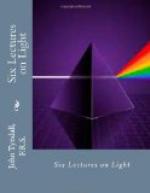If you can tolerate freedom of speech on my part, I will answer this question by an illustration. Strip a strong arm, and regard the knotted muscles when the hand is clenched and the arm bent. Is this exhibition of energy the work of the muscle alone? By no means. The muscle is the channel of an influence, without which it would be as powerless as a lump of plastic dough. It is the delicate unseen nerve that unlocks the power of the muscle. And without those filaments of genius, which have been shot like nerves through the body of society by the original discoverer, industrial America, and industrial England, would be very much in the condition of that plastic dough.
At the present time there is a cry in England for technical education, and it is a cry in which the most commonplace intellect can join, its necessity is so obvious. But there is no such cry for original investigation. Still, without this, as surely as the stream dwindles when the spring dies, so surely will ‘technical education’ lose all force of growth, all power of reproduction. Our great investigators have given us sufficient work for a time; but if their spirit die out, we shall find ourselves eventually in the condition of those Chinese mentioned by De Tocqueville, who, having forgotten the scientific origin of what they did, were at length compelled to copy without variation the inventions of an ancestry wiser than themselves, who had drawn their inspiration direct from Nature.
Both England and America have reason to bear those things in mind, for the largeness and nearness of material results are only too likely to cause both countries to forget the small spiritual beginnings of such results, in the mind of the scientific discoverer. You multiply, but he creates. And if you starve him, or otherwise kill him—nay, if you fail to secure for him free scope and encouragement—you not only lose the motive power of intellectual progress, but infallibly sever yourselves from the springs of industrial life.
What has been said of technical operations holds equally good for education, for here also the original investigator constitutes the fountain-head of knowledge. It belongs to the teacher to give this knowledge the requisite form; an honourable and often a difficult task. But it is a task which receives its final sanctification, when the teacher himself honestly tries to add a rill to the great stream of scientific discovery. Indeed, it may be doubted whether the real life of science can be fully felt and communicated by the man who has not himself been taught by direct communion with Nature. We may, it is true, have good and instructive lectures from men of ability, the whole of whose knowledge is second-hand, just as we may have good and instructive sermons from intellectually able and unregenerate men. But for that power of science, which corresponds to what the Puritan fathers would call experimental religion in the heart, you must ascend to the original investigator.




